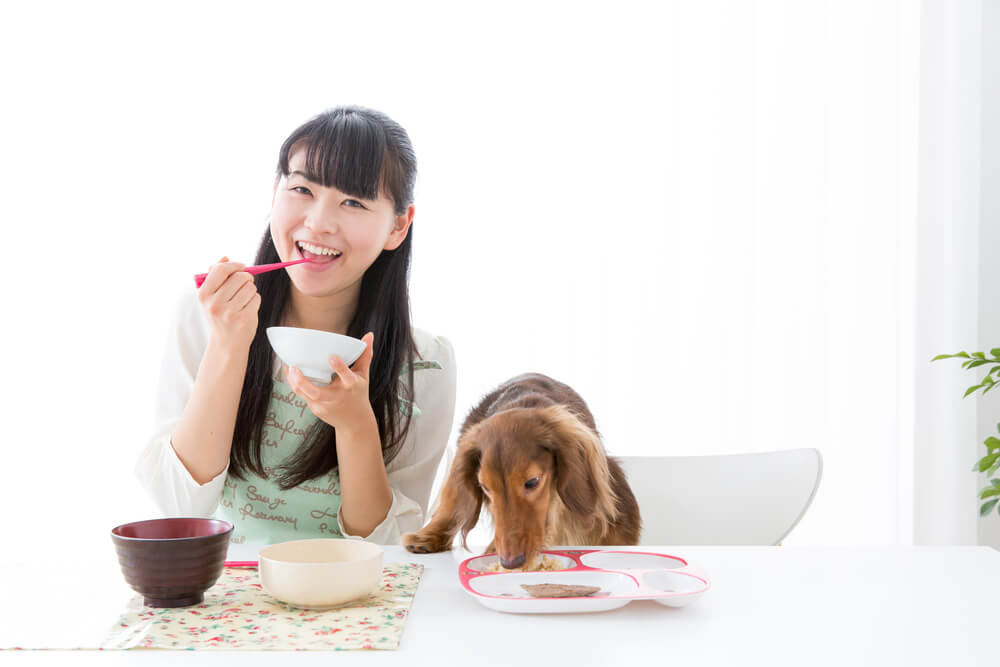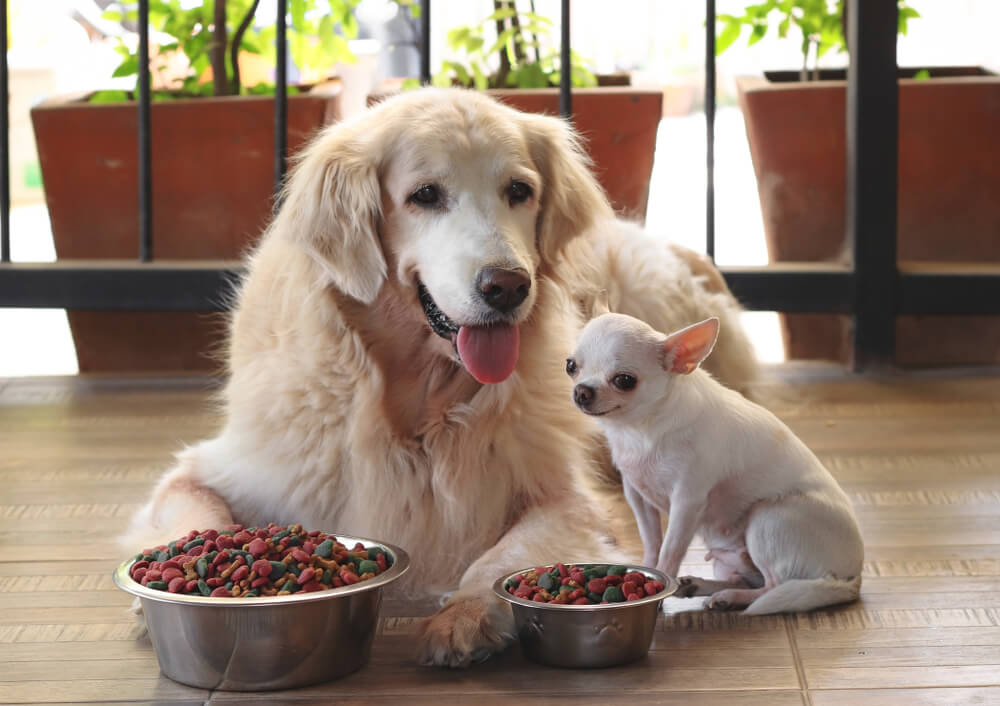List of Human Foods Dogs Can and Can't Eat

Table of Contents
Listen To The Article
In order to keep your dog healthy and thus ensure a long, fulfilling relationship, it’s crucial to give him a proper diet.
However, this may be easier said than done, considering the large number of “people” foods that are simply unfit for a man’s best friend.
To save you the trouble of going through each ingredient individually, here is a simple list of foods dogs can and can’t eat.
We share our hearts and homes (and for some lucky pups, even the foot of our beds) with our canine pals.
Surely there is nothing wrong with sharing our favorite foods with them too, right?
Not necessarily.
Many of the foods, such as fruits and vegetables, that humans digest just fine can wreak havoc on a dog’s body, causing severe health problems.
On the other hand, some of the foods people eat can be introduced to a dog’s diet just fine, and even provide health benefits such as joint strength, better breath, and allergy immunity.
But before giving the dog foods that you crave, read on and learn which foods are safe, and which can send your dog straight to the emergency vet.
And always be mindful that even healthy foods fed in excess can lead to canine obesity.
For this reason, some foods are safe for humans to eat but maybe toxic and potentially deadly for dogs.
On the other hand, there are many human foods that are perfectly safe and even healthy for dogs to eat as an occasional treat.

Human Food Dog Can Eat
Bread
Yes, dogs can eat bread. Small amounts of plain bread (no spices and definitely no raisins) won’t hurt your dog, but it also won’t provide any health benefits either.
It has no nutritional value and can really pack on the carbohydrates and calories, just like in people.
Homemade bread is a better option than store-bought, as bread from the grocery store typically contains unnecessary preservatives, but it’s best to avoid it altogether.
Cashews
Yes, dogs can eat cashews. Cashews are OK for dogs, but only a few at a time.
They’ve got calcium, magnesium, antioxidants, and proteins, but while these nuts contain less fat than others, too many can lead to weight gain and other fat-related conditions.
A few cashews make a nice treat, but only if they’re unsalted.
Cheese
Yes, dogs can eat cheese in small to moderate quantities.
As long as your dog isn’t lactose intolerant, which is rare, but still possible in canines, cheese can be a great treat.
Many kinds of cheese can be high in fat, so go for lower-fat varieties like cottage cheese or mozzarella.
Many dogs enjoy their very own dog-specific Himalayan dog chew made of dried cheese.
Coconut
Yes, coconut is OK for dogs. This funky fruit contains lauric acid, which can help combat bacteria and viruses.
It can also help with bad breath and clearing up skin conditions like hot spots, flea allergies, and itchy skin.
Coconut milk and coconut oil are safe for dogs too. Just be sure your dog doesn’t get its paws on the furry outside of the shell, which can get lodged in the throat.
Corn
Yes, dogs can eat corn.
Corn is one of the most common ingredients in most dog foods.
However, the cob can be hard for a dog to digest and may cause an intestinal blockage, so if you’re sharing some corn, make sure it is off the cob.
Eggs
Yes, dogs can eat eggs.
Eggs are safe for dogs as long as they are fully cooked. Cooked eggs are a wonderful source of protein and can help an upset stomach.
However, eating raw egg whites can contribute to biotin deficiency, so be sure to cook the eggs all the way through before giving them to your pet.
Fish
Yes, dogs can eat fish. Fish contains good fats and amino acids, giving your dog a nice health boost.
Salmon and sardines are especially beneficial salmon because it’s loaded with vitamins and protein, and sardines.
After all, they have soft, digestible bones for extra calcium.
Except for sardines, be sure to pick out all the tiny bones, which can be tedious but is definitely necessary.
Never feed your dog uncooked or undercooked fish, only fully cooked and cooled, and limit your dog’s fish intake to no more than twice a week.
Ham
Yes, dogs can eat ham.
Ham is OK for dogs to eat, but certainly isn’t the healthiest for them.
Ham is high in sodium and fat, so while sharing a small piece is all right, it shouldn’t be a continuous habit.
Honey
Yes, dogs can eat honey.
Honey is packed with countless nutrients such as vitamins A, B, C, D, E, and K, potassium, calcium, magnesium, copper, and antioxidants.
Feeding dogs small amounts of honey can help with allergies because it introduces small amounts of pollen to their systems, building up immunity to allergens in your area.
In addition to consuming honey, the sticky spread can also be used as a topical treatment for burns and superficial cuts.
Milk
Yes, dogs can have milk.
But be cautious.
Some dogs are lactose-intolerant and don’t digest milk well.
While it is OK for dogs to have a little milk, owners should be cognizant of the symptoms of lactose intolerance and might want to stick to giving their dogs water.
Peanut butter
Yes, peanut butter is OK for dogs. Peanut butter can be an excellent source of protein for dogs.
It contains heart-healthy fats, vitamins B and E, and niacin. Raw, unsalted peanut butter is the healthiest option.
Read the label carefully to be sure the peanut butter does not contain xylitol, a sugar substitute that can be toxic to dogs.
Peanuts
Yes, dogs can eat peanuts. Unlike almonds, peanuts are safe for dogs to eat.
They’re packed with good fats and proteins that can benefit your dog.
Just be sure to give peanuts in moderation, as you don’t want your dog taking in too much fat, which can lead to pancreas issues.
Also, avoid salted peanuts. Too much salt is hard for dogs to process.
Popcorn
Yes, dogs can eat popcorn. Unsalted, unbuttered, air-popped popcorn is OK for your dog in moderation.
It contains riboflavin and thiamine, both of which promote eye health and digestion, as well as small amounts of iron and protein.
Be sure to pop the kernels all the way before giving them to your dog, as unpopped kernels could become a choking hazard.
Pork
Yes, dogs can eat pork.
Pork is a highly digestible protein, packed with amino acids, and it contains more calories per pound than other meats.
Pork also may be less likely to cause an allergic reaction in some pets compared to other proteins.
Quinoa
Yes, quinoa is OK for dogs.
You can now find quinoa in some high-quality dry dog foods.
The strong nutritional profile of quinoa makes it a healthy alternative to corn, wheat, and soy starches that are often used to make kibble.
Salmon
Yes, dogs can eat salmon.
As mentioned above, fully cooked salmon is an excellent source of protein, good fats, and amino acids. It promotes joint and brain health and gives dog immune systems a nice boost.
However, raw or undercooked salmon contains parasites that can make dogs very sick, causing vomiting, diarrhea, dehydration, and, in extreme cases, even death.
Be sure to cook salmon all the way through (the FDA recommends at least 145 degrees Fahrenheit) and the parasites should cookout.
Shrimp
Yes, shrimp is OK for dogs.
A few shrimp now and then is fine for your dog, but only if they are fully cooked and the shell (including the tail, head, and legs) is removed completely.
Shrimp are high in antioxidants, vitamin B-12, and phosphorus, but also low in fat, calories, and carbohydrates.
Tuna
Yes, dogs can eat tuna, but only in small amounts. In moderation, cooked, fresh tuna is an excellent source of omega-3 fatty acids, which promotes heart and eye health.
As for canned tuna, it contains small amounts of mercury and sodium, which should be avoided in excess.
A little bit of canned tuna and tuna juice here and there is finely prepared only in water, not oil as long as it doesn’t contain any spices.
Turkey
Yes, dogs can eat turkey.
Turkey is fine for dogs, but be sure to remove excess fat and skin from the meat.
Don’t forget to check for bones; poultry bones can splinter during digestion, causing blockage or even tears in the intestines.
Any meat with excessive salt, seasonings, onions, or garlic should not be fed.
Wheat/grains
Yes, dogs can eat wheat and other grains. Dogs do not have to be grain-free; it is perfectly OK for them to have grains.
In fact, grains like wheat and corn are great sources of protein, essential fatty acids, and fiber.
If your dog has certain allergies, however, it might be best to avoid grains, but it truly depends on your dog.
Ask your veterinarian for recommendations.
Yogurt
Yes, yogurt is OK for dogs.
Plain yogurt is a perfectly acceptable snack for dogs. However, some dogs may have trouble digesting dairy products.
If your dog can digest it, the active bacteria in yogurt can help strengthen the digestive system with probiotics.
Plain yogurt is the best choice.
Avoid any yogurts with added sugar, and skip all yogurt with artificial sweeteners.

Human Food Dog Can’t Food
Almonds
No, dogs shouldn’t eat almonds.
Almonds may not necessarily be toxic to dogs like macadamia nuts are, but they can block the esophagus or even tear the windpipe if not chewed completely.
Salted almonds are especially dangerous because they can increase water retention, which is potentially fatal to dogs prone to heart disease.
Xylitol
Xylitol is a common ingredient used to replace sugar and is commonly found in chewing gum and sweets.
It is also used as a food additive.
Xylitol can cause insulin release, hypoglycemia, comas, liver damage, and blood clotting disorders in dogs.
Chocolate
No, dogs should never eat chocolate.
This isn’t just an urban legend.
Chocolate contains toxic substances called methylxanthines, which are stimulants that stop a dog’s metabolic process.
Even just a little bit of chocolate, especially dark chocolate, can cause diarrhea and vomiting.
A large amount can cause seizures, irregular heart function, and even death.
Do not have chocolate in an accessible location for your dog.
If your dog does ingest chocolate, contact a veterinarian or Pet Poison Helpline as soon as possible.
Cinnamon
No, dogs shouldn’t eat cinnamon.
While cinnamon is not actually toxic to dogs, it’s probably best to avoid it.
Cinnamon and its oils can irritate the inside of dogs’ mouths, making them uncomfortable and sick.
It can lower a dog’s blood sugar too much and can lead to diarrhea, vomiting, increased, or decreased heart rate, and even liver disease.
If they inhale it in powder form, cinnamon can cause difficulty breathing, coughing, and choking.
Garlic
No, dogs shouldn’t eat garlic.
Like onions, leeks, and chives, garlic is part of the Allium family, and it is five times more toxic to dogs than the rest of the Allium plants.
Garlic can create anemia in dogs, causing side effects such as pale gums, elevated heart rate, weakness, and collapse.
Poisoning from garlic and onions may have delayed symptoms, so if you think your dog may have eaten some, monitor him or her for a few days, not just right after consumption.
Ice cream
No, dogs shouldn’t eat ice cream.
As refreshing of a treat as the ice cream is, it contains lots of sugar so it is best not to share with your dog.
Also, some dogs have an intolerance to lactose.
To avoid the milk altogether, freeze chunks of strawberries, raspberries, apples, and pineapples to give to your dog as a sweet, icy treat.
Macadamia nuts
No, dogs should never eat macadamia nuts. These are some of the most poisonous foods for dogs.
Macadamia nuts, part of the Proteaceae family, can cause vomiting, increased body temperature, inability to walk, and lethargy.
Even worse, they can affect the nervous system. Never feed your dog macadamia nuts.
Onions
You should never feed your dog onions.
Onions contain N-propyl disulfide, a compound that is toxic to dogs.
It can damage your dog’s red blood cells, reducing their ability to carry oxygen through the body.
This often results in a condition called anemia.
Anemia in dogs is characterized by a variety of symptoms, including lethargy, weakness, decreased appetite, and fainting. In severe cases, dogs with anemia may need a blood transfusion.
It is important to note that all components and forms of onions are toxic to dogs, even the leaves, juice, and processed powders, such as onion powder.
Avocado
Avocados should never be consumed by dogs.
This is because they contain a toxin called persin, which is known to be very poisonous to dogs.
It may lead to fluid accumulation in their lungs and chest, which can cause breathing difficulties, oxygen deprivation, and even death.
Persin is found in all parts of the avocado, including the fruit, pit, leaves, and bark.
Thus, you should always keep avocados away from your dog.
Coffee and Tea
Coffee and tea are dangerous for dogs to consume due to their caffeine contents.
Caffeine stimulates your dog’s nervous system, which can lead to a number of symptoms, including hyperactivity, vomiting, diarrhea, elevated heart rate, seizures, and tremors.
Lung failure and abnormal heart rhythm may result from too much caffeine, which can ultimately lead to death.
Even small amounts of caffeine can cause adverse effects in dogs, so you should always keep coffee and tea out of your dog’s reach.
Alcohol
Dogs should never consume alcohol.
Consuming even small amounts of it may lead to ethanol poisoning in dogs.
This causes tiredness, lack of coordination, seizures, vomiting, and diarrhea.
If a dog consumes too much alcohol, it can result in more severe symptoms, such as heart attack, lung failure, coma, and even death.
Products that contain alcohol, such as alcoholic beverages, perfumes, mouthwash, and cleaning products, should always be kept away from your dog.
Nutmeg
Nutmeg is not safe for dogs to eat.
This is because nutmeg contains myristicin, a compound that is toxic to dogs when consumed in large amounts.
It may cause disorientation, increased heart rate, high blood pressure, dry mouth, stomach pain, and seizures.
You should keep nutmeg out of your dog’s reach and prevent him from consuming baked goods and other foods that contain nutmeg.
Lemons and Limes
Lemons and limes can be toxic to your dog.
This is because the skins of lemons and limes contain a substance called psoralen, which can cause dogs to have gastrointestinal symptoms like vomiting and diarrhea.
If very large amounts of psoralen are consumed by dogs, more severe symptoms, such as muscle tremors, difficulty walking, liver failure, and death, can result.
Raw Yeast Dough
It is extremely unsafe for dogs to eat raw yeast dough.
Raw yeast dough is a concern because yeast cells produce alcohol as they ferment, which may lead to alcohol poisoning and death if your dog consumes it.
Furthermore, dogs that eat raw yeast dough may experience severe bloating, as the dough expands in their stomachs. This can cause difficulty breathing and weakness.

Summary
Many human foods are safe and nutritious for dogs.
However, a person should generally feed dogs these foods in moderation, as larger quantities can lead to health issues.
Consult a veterinarian before giving human foods to dogs with:
- diabetes
- weight issues
- food sensitivities
- liver or kidney disease
- other health concerns
It is crucial to keep any foods or substances that are dangerous for dogs out of their reach.
Foods that are especially harmful to dogs include:
- anything containing alcohol
- chocolate, coffee, and caffeine
- products containing xylitol
If in doubt about a particular food, speak to a veterinarian before giving it to the dog.
Anyone who suspects that their dog has ingested something potentially harmful should immediately call a veterinarian




